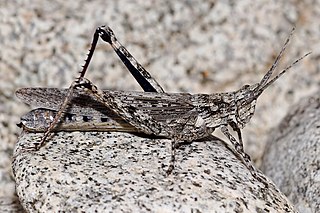
The Acrididae are the predominant family of grasshoppers, comprising some 10,000 of the 11,000 species of the entire suborder Caelifera. The Acrididae are best known because all locusts are of the Acrididae. The subfamily Oedipodinae is sometimes classified as a distinct family Oedipodidae in the superfamily Acridoidea. Acrididae grasshoppers are characterized by relatively short and stout antennae, and tympana on the side of the first abdominal segment.

Bandwings, or band-winged grasshoppers are the subfamily Oedipodinae of grasshoppers classified under the family Acrididae. They have a worldwide distribution and were originally elevated to full family status as the Oedipodidae. Many species primarily inhabit xeric weedy fields, and some are considered to be important locusts:
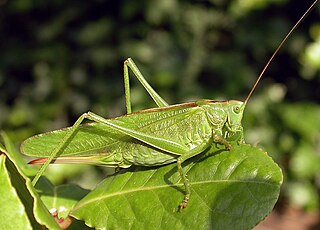
The subfamily Tettigoniinae, sometimes called shield-backed katydids, contains hundreds of species, which are native to the Americas, Australia, southern Africa, Europe, and the Near East. The faunas of the Neotropics and Australia are more closely related to one other than to those of southern Africa, although the three groups are related. They are attributed to an ancient Gondwana fauna which is reflected in the known distribution of the southern African genera, which are in turn related to the North American genera Neduba and Aglaothorax. Many of the common northern European species are in this subfamily.
Toxoderidae is a family of praying mantises.

The Phaneropterinae, the sickle-bearing bush crickets or leaf katydids, are a subfamily of insects within the family Tettigoniidae. Nearly 2060 species in 85 genera throughout the world are known. They are also known as false katydids or round-headed katydids.
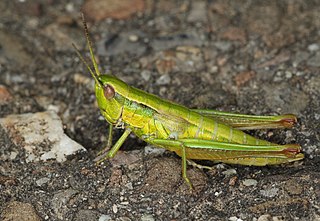
Gomphocerinae, the slant-faced grasshoppers, are a subfamily of grasshoppers found on every continent but Antarctica and Australia.
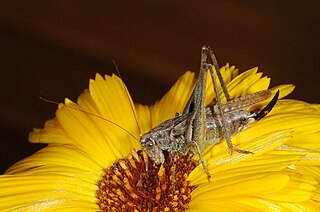
Platycleis is a genus of katydids described by Fieber in 1852, belonging to the subfamily Tettigoniinae. The species of this genus are present in Europe, North Africa and, Asia.

The Copiphorini are a tribe of bush crickets or katydids in the family Tettigoniidae. Previously considered a subfamily, they are now placed in the subfamily Conocephalinae. Like some other members of Conocephalinae, they are known as coneheads, grasshopper-like insects with an extended, cone-shaped projection on their heads that juts forward in front of the base of the antennae.

Oxyinae is subfamily of grasshoppers in the family Acrididae. Species are distributed throughout Africa and Australasia.

Valanga is a genus of "bird grasshoppers" in the subfamily Cyrtacanthacridinae. Species are found from the Indian subcontinent through southeast Asia and the Korean peninsula to Australia and the Pacific islands.

Podismini is a tribe of "spur-throated grasshoppers" in the family Acrididae. This tribe is unlike others in the subfamily Melanoplinae in that a substantial number of genera occur outside the Americas.

The Hemiacridinae are a subfamily of Acrididae in the Orthoptera: Caelifera. Species can be found in Africa, and Asia.

Dociostaurus is a genus of grasshoppers in the family Acrididae, subfamily Gomphocerinae, found in Africa, southern Europe and Asia.
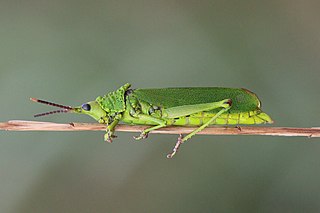
The Pyrgomorphinae are a sub-family of grasshoppers in the family Pyrgomorphidae. Species are found in, especially the warmer parts of: Central and South America, southern Europe, Africa, Asia, Australia and Pacific Islands. The type genus is Pyrgomorpha and names dates from "Pyrgomorphiden" by Brunner von Wattenwyl, 1874. The first use of Pyrgomorphinae was by Krauss in 1890.

Eucoptacra is a genus of grasshoppers in the family Acrididae and subfamily Coptacrinae. Species can be found in: Africa, India, Indo-China, peninsular Malaysia and Borneo.
Psyrana is a genus of Asian bush crickets of the tribe Holochlorini within the subfamily Phaneropterinae. They occur in Sri Lanka Indo-China, China, Korea, Japan, and Malesia to New Caledonia.

Prionotropis is a genus of grasshoppers in the family Pamphagidae. There are about nine described species in Prionotropis, found in southern Europe.
Sphodronotus is a genus of grasshoppers in the subfamily Calliptaminae, with species found in Iran.
Rhytidacris is a genus of grasshoppers in the subfamily Cyrtacanthacridinae with species found in Africa.

Kraussaria is a genus of grasshoppers in the subfamily Cyrtacanthacridinae with species found in Africa.















